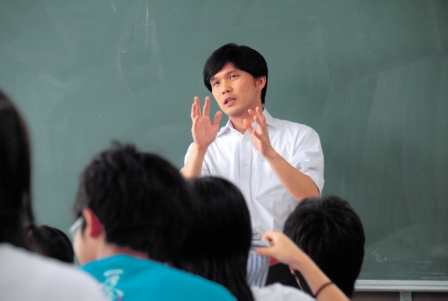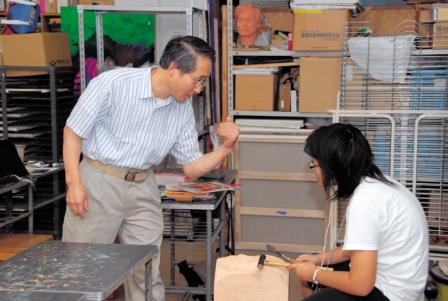


| SUBJECTS 【Japanese】  The subject of Japanese comes in three courses: contemporary literature,
Japanese classics, and kambun.(Classic Chinese reading). Equal importance is placed on these subjects
in terms of the allotted number of classes . The subject of Japanese comes in three courses: contemporary literature,
Japanese classics, and kambun.(Classic Chinese reading). Equal importance is placed on these subjects
in terms of the allotted number of classes .〈Contemporary literature〉 We read critical essays, whose accuarate interpretation requires close analysis, and are encouraged to express our own opinions about them. Also, we are taught to read novels so that we can appreciate the expression of subtle feelings in the characters. 〈Japanese classics〉 We read great classics such as The Tale of Genji while consulting a dictionary, and try to develop and deepen our interest in Japanese classics. We learn about the various lifestyles and customs of people living in those periods. 〈Kambun〉 We read poetry and prose, histories and biographies, and works of great thinkers. We try to comprehend these works correctly and deeply as we translate the original texts of Chinese classics into modern Japanese. Then we also learn the background of certain passages, and think about the influence of China on Japanese culture. 【Social studies (Japanese history, world history, geography, political science, economics, ethics)】  We study geography A and world history A in the first year, Japanese history
and ethics in the second year, and political science and economics in the
third year. They are required subjects. We study these subjects so as to
consider Japanese society from a scientific point of view. For the third
year students, there are classes of geography, Japanese history, world
history, and comprehensive social studies. They are elective subjects.
We can choose some of them according to our interests.At the Toin Cultural Festival, the products of summer assignments are displayed. We study geography A and world history A in the first year, Japanese history
and ethics in the second year, and political science and economics in the
third year. They are required subjects. We study these subjects so as to
consider Japanese society from a scientific point of view. For the third
year students, there are classes of geography, Japanese history, world
history, and comprehensive social studies. They are elective subjects.
We can choose some of them according to our interests.At the Toin Cultural Festival, the products of summer assignments are displayed. 【Mathematics】  What is your impression of the math classes in high school? Math at this school is taught interactively. The reason is that even if we memorize formulas exclusively and practice applying them repeatedly so as to be able to solve the problems on entrance examinations, we will not be able to develop or further the ability to think logically and express our own opinions. So there are frequent chances to think and exchange and share our views in the math classes in this school. What is your impression of the math classes in high school? Math at this school is taught interactively. The reason is that even if we memorize formulas exclusively and practice applying them repeatedly so as to be able to solve the problems on entrance examinations, we will not be able to develop or further the ability to think logically and express our own opinions. So there are frequent chances to think and exchange and share our views in the math classes in this school. 【Science】  Experimentations and observations are regarded as the two most important
activities in science classes. In order to facilitate them, there are four
laboratories and three lecture rooms in this school. The range of experimentation
is vast. Experimentations and observations are regarded as the two most important
activities in science classes. In order to facilitate them, there are four
laboratories and three lecture rooms in this school. The range of experimentation
is vast.We take at least three subjects from among physics, chemistry, biology, and earth science. By doing so, we can acquire a well-balanced scientific understanding, and we can utilize it in deciding on our future. 【Foreign languages】  In this school, English is not considered just as a subject, but as a means of communication. Therefore, the classes embrace and aim at developing the four basic skills (listening, speaking, reading, and writing). There are classes taught by a native speaker once a week for the first grade students. We strengthen our basic communication skills in the first half of our high school days. In the latter half, we attempt to acquire higher language proficiency. In 2008, we received a ‘‘School Prize’’ in the Zen-Ei-Ren all Japan English composition contest. In addition to English, we can study German or French in the second and third years. 【Health and physical education】  We have a school ground large enough to hold a regulation size soccer field, a gymnasium where three volleyball games could be played at the same time, a multipurpose court, a martial arts facility, and a swimming pool. We take two credits in the first year, and three credits in the second and third years. In the health education class, we study health-related topics and issues, as well as learn about the cultural sides of sports. 【Home economics】  We study basic home economics as a required subject in the second year and food science as an optional subject in the third year. In the basic home economics class, we study things that will be useful for our lives in the future. We study basic home economics as a required subject in the second year and food science as an optional subject in the third year. In the basic home economics class, we study things that will be useful for our lives in the future.In the food science classes, we set aside ample time for cooking, and learn about eating habits. 【Art, industrial arts, music, calligraphy】  We choose one subject from among these four when we enter school. We study various styles and effects of artistic expressions, and cultivate aesthetic senses through creative activities. In the second year, the students either give a concert or display their works at the Toin Festival. We choose one subject from among these four when we enter school. We study various styles and effects of artistic expressions, and cultivate aesthetic senses through creative activities. In the second year, the students either give a concert or display their works at the Toin Festival. 【Informatics】  We take two credits in informatics (media literacy) in the first year. We take two credits in informatics (media literacy) in the first year.We learn how to gather correct information, put data in order, and convey information through a variety of approaches involving group and personal research. |